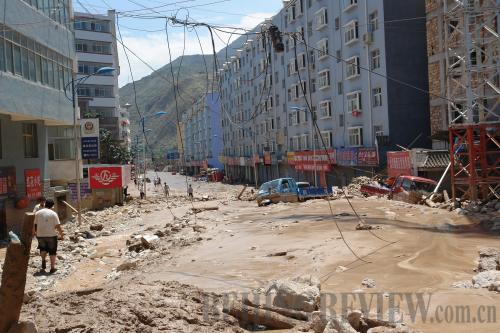|
 |
|
FLOODED TOWN: A street corner in Zhouqu County on August 8 after it was flooded by a clogged river that runs across the county (GONG ZHIYONG) |
Residents of Zhouqu County, Gannan Tibetan Autonomous Prefecture in northwest China's Gansu Province, went to bed on the seemingly uneventful evening of August 7, but woke to floodwaters surging though their homes. Forced to climb atop buildings to escape drowning, many watched as their houses collapsed in front of them or were submerged by the rushing water.
Even less fortunate were those killed by devastating landslides while they slept. At around midnight, a downpour of up to 97 mm of rain over a 40-minute period triggered four massive landslides in two valleys in mountain ranges northeast of Zhouqu. The landslides flattened three villages and buried 300 households. The leveled area, about 300 meters wide and 5 km long, is home to nearly 2,000 people.
The landslides carried about 1.8 million cubic meters of rock and mud that quickly blocked the Bailong River, which runs through the county seat. The river soon flooded, overtaking buildings along the riverbank, and eventually engulfed about two thirds of the county seat, where water levels rose to 4 meters in some areas. A total of more than 19,000 people living in two townships along the lower reaches of the river were evacuated during the morning of August 8.
The floods and landslides affected nearly 50,000 people in the mountainous county, which sits in the Bailong River valley and is hemmed in by craggy mountains on both sides. By August 11, at least 1,117 people were confirmed dead and rescuers were racing against the clock to save 627 others that were still missing.
Sludge and rocks, as deep as 2 meters, spread across some major roads in the county. Many trapped residents waited on rooftops for rescuers, said a press release from the general office of the Gansu Provincial Committee of the Communist Party of China (CPC) on August 8.
"Now sludge has become the biggest hindrance to rescue operations. It's too thick to walk or drive through," said Diemu Jiangteng, head of the county, on August 8.
"Since excavators can't reach the site, we can only use spades and our hands to rescue the buried," He Youxin, an armed police officer, said the same day.
Also on August 8, the Gansu branch of the State Grid Corp. said that two thirds of the county's power went out immediately after the disaster. Most communication links were also down due to the loss of electricity.
The county's only faucet water system was destroyed in the landslides and floods, and the county badly needed 10,000 tons of water and 500 tons of instant food for the following 25 days, at which point life was expected to return to normal, said a spokesman with the prefecture's government on August 8.
According to China's Ministry of Agriculture (MOA), the deadly mudslides affected more than 200 hectares of farmland and swept away over 10,000 heads of livestock.
At a press conference on August 9, Minister of Land and Resources Xu Shaoshi enumerated several causes for the geological disaster: the county's loose, weathered terrain that is prone to landslides and other disasters; the massive earthquake of 2008 in Wenchuan, neighboring Sichuan Province, that shook the mountains around Zhouqu; the sustained drought and soil erosion in the region since last winter; and the torrential rains on August 7 night.
| 